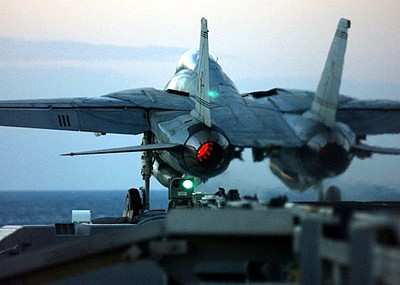DOD Seeks To Block Iran From Securing Parts For F-14 Fleet
Stay alert, Tom Cruise. Iran has an eye on your "Top Gun" jet,
as law enforcement experts say the country is aggressively seeking
parts for its Tomcats, according to the Associated Press.

The Defense Department disclosed Thursday that not only had it
taken off the surplus auction market parts from F-14 Tomcat fighter
jets, but its January action also included parts from other planes
and support equipment that could be used in connection with
Tomcats.
The Tomcat, of course, is the jet made famous by the infamous
Tom Cruise in the 1986 movie "Top Gun."
The Pentagon's retired F-14's 76,000 components in January; many
of them had been functional on other planes and had been sold on
the surplus market. This new revelation reports that the suspension
actually included 163,000 components - including those that support
other aircraft, but could be used in connection with the
Tomcats.
"You're talking about things like the nuts and bolts ... to
military-unique and -specific things, to ground equipment, to
igniters and engine parts," said Dawn Dearden, spokeswoman for the
Defense Logistics Agency (DLA).
"We want to make sure that we're doing the prudent thing here,
we want to make sure that we hold onto everything that could be
used on the F-14."
The Pentagon surplus security review will likely be completed
this year, Dearden said.
As ANN had reported, Senator Wyden
called for a permanent ban on the sale of leftover F-14 Tomcat
parts over concerns those supplies could fall into the wrong
hands.
As a US ally in the 1970s, Iran received US permission to buy
the fighter jets; it is now the only country known struggling to
keep its F-14s airworthy. The US retired its own Tomcats last
year.
The Pentagon review comes as legislation that would permanently
ban the sale of surplus F-14 parts moves through Congress.
 The bill was first proposed by
Senator Ron Wyden (D-OR)in January after The Associated Press
reported that middlemen for such countries as Iran and China had
taken advantage of Pentagon surplus sale security weaknesses to
acquire sensitive military equipment, including missile components
and parts for Tomcats and other aircraft.
The bill was first proposed by
Senator Ron Wyden (D-OR)in January after The Associated Press
reported that middlemen for such countries as Iran and China had
taken advantage of Pentagon surplus sale security weaknesses to
acquire sensitive military equipment, including missile components
and parts for Tomcats and other aircraft.
Law enforcement officials are aware of at least one case in
which a surplus purchase ended up in Iran.
"The new development, when we're talking about this range of
parts, this is an incredible number," Wyden said Thursday, adding
that it makes him wonder what else other countries are acquiring
through the military's surplus sales.
"I think the first thing the Pentagon ought to do," he said, "is
support our legislation to make this a permanent ban," referring to
F-14 part sales. "And when the ink is dry on that, they ought to
get out there and take a look at the other areas."
Even as the Pentagon had planned to sell thousands of spare F-14
parts that could be used on multiple types of aircraft, following
the AP's report, it suspended the sales while it conducts a
security review of the jet components.
The contractor that handles surplus sales for the Pentagon,
Government Liquidation, sent Wyden a letter this week endorsing the
legislation, known as the "Stop Arming Iran Act."
"Like you, we feel that no sensitive military equipment should
reach Iran," said company Vice President Anthony Humpage.
Last summer the Government Accountability Office (GAO) reported
that an undercover review found numerous gaps in surplus sale
security.
Following that report and at the Pentagon's request, Government
Liquidation took steps to establish new inventory controls to stop
sensitive items from slipping into surplus sales, the company
said.
"Before, all our responsibility was to sell things," said
Humpage. "Now we scan everything that we receive, run it against
two DLA databases and our own buzzwords list to make sure that we
don't even offer up anything on our Web site."
 ANN's Daily Aero-Term (05.07.25): Terminal Radar Service Area
ANN's Daily Aero-Term (05.07.25): Terminal Radar Service Area ANN's Daily Aero-Linx (05.07.25)
ANN's Daily Aero-Linx (05.07.25) Classic Aero-TV: Anousheh Ansari -- The Woman Behind The Prize
Classic Aero-TV: Anousheh Ansari -- The Woman Behind The Prize NTSB Prelim: Bell 206B
NTSB Prelim: Bell 206B Airborne-NextGen 05.06.25: AF Uncrewed Fighters, Drones v Planes, Joby Crew Test
Airborne-NextGen 05.06.25: AF Uncrewed Fighters, Drones v Planes, Joby Crew Test




